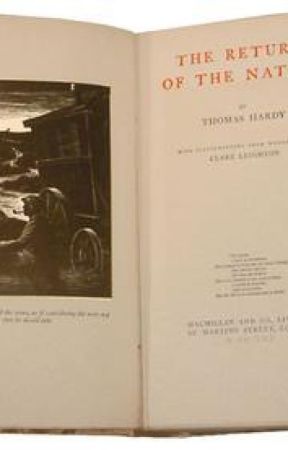In Clym Yeobright's face could be dimly seen the typical countenance of the future. Should there be a classic period to art hereafter, its Pheidias may produce such faces. The view of life as a thing to be put up with, replacing that zest for existence which was so intense in early civilizations, must ultimately enter so thoroughly into the constitution of the advanced races that its facial expression will become accepted as a new artistic departure. People already feel that a man who lives without disturbing a curve of feature, or setting a mark of mental concern anywhere upon himself, is too far removed from modern perceptiveness to be a modern type. Physically beautiful men—the glory of the race when it was young—are almost an anachronism now; and we may wonder whether, at some time or other, physically beautiful women may not be an anachronism likewise.
The truth seems to be that a long line of disillusive centuries has permanently displaced the Hellenic idea of life, or whatever it may be called. What the Greeks only suspected we know well; what their Aeschylus imagined our nursery children feel. That old-fashioned revelling in the general situation grows less and less possible as we uncover the defects of natural laws, and see the quandary that man is in by their operation.
The lineaments which will get embodied in ideals based upon this new recognition will probably be akin to those of Yeobright. The observer's eye was arrested, not by his face as a picture, but by his face as a page; not by what it was, but by what it recorded. His features were attractive in the light of symbols, as sounds intrinsically common become attractive in language, and as shapes intrinsically simple become interesting in writing.
He had been a lad of whom something was expected. Beyond this all had been chaos. That he would be successful in an original way, or that he would go to the dogs in an original way, seemed equally probable. The only absolute certainty about him was that he would not stand still in the circumstances amid which he was born.
Hence, when his name was casually mentioned by neighbouring yeomen, the listener said, "Ah, Clym Yeobright—what is he doing now?" When the instinctive question about a person is, What is he doing? it is felt that he will be found to be, like most of us, doing nothing in particular. There is an indefinite sense that he must be invading some region of singularity, good or bad. The devout hope is that he is doing well. The secret faith is that he is making a mess of it. Half a dozen comfortable market-men, who were habitual callers at the Quiet Woman as they passed by in their carts, were partial to the topic. In fact, though they were not Egdon men, they could hardly avoid it while they sucked their long clay tubes and regarded the heath through the window. Clym had been so inwoven with the heath in his boyhood that hardly anybody could look upon it without thinking of him. So the subject recurred: if he were making a fortune and a name, so much the better for him; if he were making a tragical figure in the world, so much the better for a narrative.
The fact was that Yeobright's fame had spread to an awkward extent before he left home. "It is bad when your fame outruns your means," said the Spanish Jesuit Gracian. At the age of six he had asked a Scripture riddle: "Who was the first man known to wear breeches?" and applause had resounded from the very verge of the heath. At seven he painted the Battle of Waterloo with tiger-lily pollen and black-currant juice, in the absence of water-colours. By the time he reached twelve he had in this manner been heard of as artist and scholar for at least two miles round. An individual whose fame spreads three or four thousand yards in the time taken by the fame of others similarly situated to travel six or eight hundred, must of necessity have something in him. Possibly Clym's fame, like Homer's, owed something to the accidents of his situation; nevertheless famous he was.
He grew up and was helped out in life. That waggery of fate which started Clive as a writing clerk, Gay as a linen-draper, Keats as a surgeon, and a thousand others in a thousand other odd ways, banished the wild and ascetic heath lad to a trade whose sole concern was with the especial symbols of self-indulgence and vainglory.

YOU ARE READING
The Return of the Native (Completed)
ClassicsThe Return of the Native is Thomas Hardy's sixth published novel. It first appeared in the magazine Belgravia, a publication known for its sensationalism, and was presented in twelve monthly installments from January to December 1878. Because of the...
